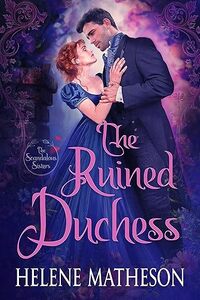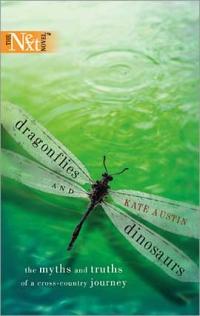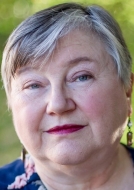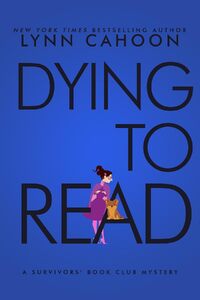 THE RUINED DUCHESS |
 The books of May are here—fresh, fierce, and full of feels. |

Purchase
Harlequin NEXT 24 Romance Series Excerpt of Dragonflies and Dinosaurs by Kate AustinDragonflies live two different lives, in two different worlds. The young dragonfly begins its life in the water, eventually crawling out of the pond to transform itself into a superb aerial hunter with a wing span as big as 7.5 inches across. — The Sunshine Coast News, September 14, 2005 We measured our progress by red-tailed hawks and the iridescent carcasses of dragonflies flickering against the windshield in the warm light of the setting sun. Eric and I counted the hawks, learning, as we crossed the endless prairie miles, to recognize their call, the broad silhouette of their wings in flight, and to spot them sitting still as death on fence posts and telephone poles. At each stop — for gas, for food, for a cheap, sometimes clean motel — Mickey analyzed, bagged and recorded the wings stuck in the florid yellow smudges on the windshield. And then he carefully cleaned the glass until it reflected, without a flaw, the flaming prairie sun. The wings were all that remained of the dragonflies after their abrupt halt against our windshield. Mickey used my eyebrow tweezers to tug them from the baked-on sludge surrounding them. He was extraordinarily patient, his wiry body stretched out over the boiling hood of the car, the tweezers in one hand, a plastic container in the other. I watched him. No longer a little boy, his face had thinned out over the past weeks, grown definition and character. His white T-shirt and shorts, even his untanned skin, vanished into the milky haze of prairie heat. His short dark hair and matching eyes remained, burning holes in the air between us. Mickey's obsession with this form of violent death made me nervous. So did Eric's silence. And the huge blue cloudless bowl of the sky above us, day after perfect day, made me want to crawl into a cave. The white lines disappearing beneath the car gave me the heebie-jeebies — one, two, three, four. Break. One, two, three, four. Another break. Mickey counted out loud, and my head rang to the sound of his voice. One, two. Three, four. Pause. I'd get used to one rhythm, then he'd change it. One. Two, three, four. Pause. One, two, three. Four. But I couldn't ask him to stop. When he did stop, that made me nervous too. I turned my head to check that he was okay. He had pulled earphones over his ears, closed his eyes and vanished into the music. I rolled up my window to shut out the sound of the highway and heard the faint tinny sounds of Limp Bizkit. I glanced in the rearview mirror. Eric shrugged and turned back to his sketchbook, drawing God knows what. The one glimpse I'd had of his sketch pad since we left home, before he shut it in my face, was a drawing of a tiger devouring a fawn, in excruciating detail and vibrant, unreal colors. I couldn't remember the last time he'd spoken. We weren't moving fast. Not with two boys aged twelve and fifteen. They slept until noon, insisted on showers and full breakfasts. By then it was past lunch-time. Finally on the road, we didn't make time; we made pit stops. The car filled up with sticky slurpy cups and rattling aluminum cans. On this trip two hundred kilometers was a good day's journey, even across the straight-lined prairies. I bit my tongue and pulled into another rest stop, gas station or tourist attraction. I handed over money for drinks, food, admission. I stopped at a bank machine at least once a day. The idea for this journey had begun in a brightly lit hospital room two weeks ago on the day we learned that my sister, their mother, wasn't going to die. I choked on the sour taste of vomit filling my mouth. The smell did it, antiseptic laden with a hint of stale bodies and still-warm spilled blood. That smell and the memories it brought with it. The walls were covered with battleship- gray latex, but no scraping, no cleaning, no paint could disguise the strip of pain running along the corridor, hand-high, where patients and their visitors touched the walls, leaving tiny molecules of anguish behind. I felt it rising from beneath the layers. I kept my hands clenched in my pockets because I couldn't bear to touch the walls. The good news was that this time the patient wouldn't die. Or so the doctors said, assuring us that the system was working, that detection saved Susan's life. Not early enough to save her breasts, but early enough for life. I had trouble believing, my faith in the medical system severely shaken when my young and seemingly healthy mother had gone into the hospital two years ago and never come out. My mother's nurses and doctors had told me her moans meant nothing. The medication took care of the pain. But the moans meant something to me. They meant I couldn't sleep for the fourteen days it took her to die, nor for almost a month after. Even now, I often woke to ghostly moans from the spare bedroom. Opening its door, I expected to see my mother lying on the bed, surrounded by flickering red monitor lights and moaning in the chill antiseptic air. Now Susan lay in the surgical ward of the same hospital. She smiled and beckoned me in when I knocked tentatively at her door. We looked enough alike to be twins, although I was older by a year and Susan's once-glowing, healthy skin now appeared gray and muddy. But, despite these differences, no one could mistake our shared genes. This, basically, was what I worried about. Every minute of every day since my mother went into the hospital. There had been no need for my mother to die of breast cancer, not if she'd followed recommendations and had a mammogram every year, or seen a doctor when she started feeling sick. But not my mother — no doctors or hospitals for her. She died because of who she was. That's what the doctors said. That's what Susan and I said. But Susan believed it and I didn't. So it didn't help me much. Just set me wondering how many women died of curable diseases because, like my mother, they'd had their children in the days when natural childbirth meant hours, sometimes days, of pain. Susan had the operation and was going home in a few days to start healing and then chemo, probably radiation after that. She, unlike our mother, caught the lumps before they spread throughout her body. I was specially tested twice, ultrasounds and everything, in addition to my monthly self- examination and my yearly mammogram. Everything negative — but the pages of positive results, the unequivocal good health I enjoyed, didn't convince me. No reassurance cracked the thick layer of anxiety I carried. I imagined lying in the hospital bed. I visualized every step of the operation removing my breasts. It got so I even felt the shunt in my lymph glands, and the bruising in my armpits. I imagined the day the surgeon came to tell me all hope was gone. I pictured his face, sad and forlorn because he loved me, and there was nothing he could do. I imagined my deathbed, the flowers and cards, the crying friends and family. I went to my own funeral. And I didn't do this once; I did it almost every night. I woke up in the darkest hours of the night and started right in at the beginning, with the hospital bed. I couldn't sleep until I'd imagined the funeral. My elaborate fantasy felt more real than reality. Forty-two years old and I was obsessed with my own imminent death, even though every indicator said I was fine, perfectly healthy. But I didn't believe. I couldn't. None of this showed in my face, or at least I hoped it didn't. Susan's life held enough complications without worrying about her sister. Besides, I was the strong one, the older, more mature, in-control one. Stiff upper lip, that was me. No one knew that underneath my cheerful exterior lay a quivering mass of fear and anxiety. Especially not my baby sister. Especially not now. Because today was D-day. Time to hear the results of the desperate operation to save Susan's life. I timed my visit to arrive after rounds and the pronouncement of the verdict. Life? Or death? One look at her face and I knew. She was going to be fine. Fine, that is, if you didn't count the months to come. Near-death while they killed her cancer with radiation and drugs so virulent that her body would almost die with it. And there were no guarantees. We'd wait and watch for five years and still might not know. I tried to ignore the statistics on life expectancy and recurrence and to believe, with Susan, that she would be okay. Even though I couldn't do the same for myself. I stood at the door, tears running down my face, dripping onto my yellow silk blouse until I looked as if I'd dropped not just a glass but an entire bottle of white wine onto my breasts. The blouse would never be the same but I would hang it, untouched and uncleaned, in the back of my closet, leave it there as mute evidence of a miracle. Susan's courage, and mine, flagged as the doctors enumerated the cost of living. What about the boys? My nephews? The loves of my life? How could she ask them to watch her through weeks filled with needles and diarrhea, moaning and vomiting? How could Susan concentrate on recovery with Mickey and Eric on summer vacation? She had spent the morning coming up with a solution. "It's the reunion this summer," Susan said. I nodded. I'd had what felt like hundreds of reminders of it. At least once a week I opened my mailbox to another mimeographed newsletter headed "Cranberry Portage Reunion." It was filled with news about people I didn't know and didn't care to, cute poems in iambic pentameter, badly reproduced photographs of places I'd long forgotten. My mother would have gone to the reunion and, for her sake, I flipped through the newsletters before I threw them away. The years in Cranberry Portage were the best years of her life. She'd spent years telling me so, bemoaning her loss, reminding me of events and people I didn't want to remember. Everything in our lives suffered by comparison. She filled Susan and I with fairy tales about a town and a man so perfect they couldn't possibly exist — not in the harsh realm of northern Manitoba. Maybe not anywhere. Excerpt from Dragonflies and Dinosaurs by Kate Austin |
|
| |||
|
||||



 © 2003-2025
© 2003-2025